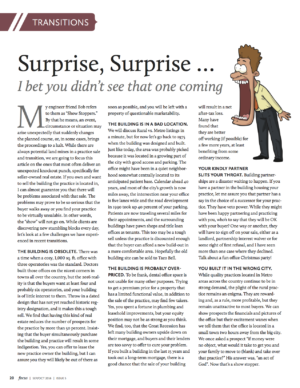 [Note – those of you who are readers of the Missouri Dental Association Focus magazine will recognize this post from Dr. Wolff’s September/October 2016 article. Click here to download a PDF of the article.]
[Note – those of you who are readers of the Missouri Dental Association Focus magazine will recognize this post from Dr. Wolff’s September/October 2016 article. Click here to download a PDF of the article.]
Many people assume that the sale and transition of a dental practice is a small and simple process. After all, how difficult can it be for a Mom and Pop sized business to transfer to new ownership? Well the fact is, there are many long and tedious steps involved in getting from a listing to a closing, directly involving the lives of the sellers, buyers, office staff and often thousands of patients. While most issues can be resolved by negotiation in good faith, there are a few things that can pop up which will have a direct effect on the value of the transaction and often, the feasibility of a sale. In some cases a little pre-sale planning might have averted disaster but often the problems are inherent to the business. In this series of posts, I’ll take a look at five elements that effectively kill off a practice transition. In it, we’ll examine a few circumstances that bubbled to the surface in the past – but rest assured, there are probably other land mines waiting to be discovered.
I’ve saved the best (or worst) for last; Real Estate.
This seems to be the one that most often delivers a knockout punch from left field. If as the seller you own and want to sell the building the practice is located in, I can almost guarantee you that there will be problems associated with that sale. Problems so serious that the buyer may walk away or you find your practice may prove to be virtually unsellable. While clients are thinking up new challenges every day, let’s look at a few possible stumbling blocks to getting through a transition;
- The building is obsolete. There was a time when a cozy, 1000 sq. ft. office with three operatories was the standard. Doctors built those offices on the nicest corners in towns all over the country but the 2016 reality is that the buyers want at least four and probably six operatories and your building is of little interest to them. Throw in a dated design that has not yet reached Historic Registry designation makes this a tough sell. We find that having real estate involved reduces the number of prospects for the practice by about 75%. Insisting that the buyer simultaneously purchase the building will result in some indigestion.
- The building is in a bad location. We will discuss Rural vs. Metro listing in a minute but for now let’s go back to 1975 when the building was platted and built. The area was probably picked because it was located in a growing part of the city with good access and parking. The office might have been in a quiet neighborhood somewhat centrally located to its anticipated patient base. Calendar ahead 40 years and most of the city’s growth is now miles away, the intersection near your office is five lanes wide and the road development in 1990 took up 40% of your parking. Patients are now traveling several miles for their appointments and the surrounding buildings have pawn shops and title loan offices as tenants. This too may be a tough sell unless the practice is discounted enough that the buyer can afford a new buildout in a more comfortable area. Hopefully the old building site can be sold to Taco Bell.
- The building is probably overpriced. Let’s get real, dental office space is not useable for much of any other purpose. Trying to get a premium price for a property that has a limited functional value, in addition to the sale of the practice will find few takers. Yes, you spent a fortune in plumbing and leasehold improvements but the value may have been in your control of your work space and/or pride of ownership. Your equity position may not be as strong as you think. We find, too, that the Great Recession has left many building owners upside down on their mortgage and buyers and lenders are too savvy to cure your problem. If you built a building in the last 15 years and took out a long term mortgage, there is a good chance that the sale of your practice and building will result in a net after tax loss. Many have found that they are better off to keep working (if possible) for a few more years, at least benefiting from some ordinary income.
- Your kindly partner slits your throat. Building partnerships are a disaster waiting to happen. If you have a partner in the building housing your practice, I can assure you that partner has a say in your choice of successor for your practice. They have veto power. While they might have been happy partnering and practicing with you, who’s to say that they will be ok with your buyer? One way or another, they will have to sign off on your sale, either as a landlord or for a right of first refusal and I have seen more than one case where they declined. Talk about a fun office Christmas party!
Dr. Steve Wolff – UMKC Class of 1977
